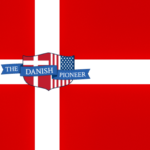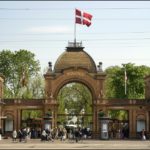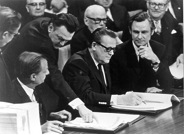
Innovative and Competitive Denmark joined the EU 40 years ago – By Rolf Buschardt Christensen
EDITOR’S NOTE: Rolf Buschardt Christensen, having worked at the European Union’s Delegation in Canada for 35 years from 1976 to 2011, has submitted the following article to The Danish Pioneer Newspaper. Christensen is also the current president of the national umbrella organization “The Federation of Danish Associations in Canada”.
The Denmark of 2013 is significantly different from the country which joined the European Union (then European Community) in January 1973. Today Denmark is an innovative, efficient and competitive country, which is adaptive, dynamic and pro-active. The EU is to a large degree responsible for these changes and Denmark now furthers its national goals as well as its international interests through the EU.
From being a protective welfare state, Denmark has given up the hope of a United Scandinavia and entered Europe, and in the process it has become one of the most innovative and competitive countries in the world, in order to deal with globalization – by being competitive.
Denmark might still be a welfare state, but increasingly it is becoming a Competition State, where the primary national goal is to be competitive. That has meant great changes to Danish policies and Danish society. The goal is therefore no longer to protect, safeguard and care for the citizens in a welfare state, but to educate, train and prepare Danes for a competitive world where globalization is a threat if you are not able to compete. A solid and free education and free universal health care are no longer just welfare benefits, but required prerequisites to provide citizens – workers – education and health – for the Competition State.
Denmark entered the EU along with Britain; that was Denmark’s policy at the time. Perhaps EU membership was necessary for economic reasons; and certainly because of Danish agricultural exports to Britain, as well as to Germany.
The first fifteen years of membership were largely devoted to adapting to the EU. In the late 1980s a major change was the completion of the common EU Internal Market. Then came the fall of the Berlin Wall in 1989; followed by the unification of Germany within a year. This in turn led to the Maastricht Treaty and the establishment of the European Union with the aim of political union of the EU Member States.
Developments evolved far too fast for the majority of Danes, and Denmark received four opt-outs: exemptions relating to the Euro, EU citizenship, justice and home affairs as well as security and defence cooperation. The four opt-outs were a set-back for Danish politicians and policy-makers – and still are.
Regardless of this setback Denmark was on board when the United States and the European Union launched their globalization initiatives in 1993. In fact, within the EU, Denmark has been in the forefront of promoting innovation, efficiency and competition.
Financially Denmark follows a policy where the Danish Krone is pegged to the Euro. Moreover, Denmark’s national debt as a percentage of Gross Domestic Product is 46%, one of the lowest in the EU. Denmark is wealthy and the Danish economy is diversified, with GDP per capita just over $55,000 in 2012. Denmark’s economic competitiveness is reflected in recurrent current account surpluses, which partly offset risks associated with the large stock of short-term debt in Denmark’s banking sector. However, economic rating institutions have repeatedly confirmed Denmark’s AAA credit rating. The positive and stable outlook reflects the view that the vigorous and diversified Danish economy will remain resilient to most foreseeable external and internal shocks.
Militarily, Denmark has finally overcome its inferiority complex, which was due to the defeat in the War of 1864 and the occupation in the Second World War. First Denmark participated in the February 1991 Gulf War and later in Afghanistan, Iraq, Libya and Mali. The Danish navy has also sent vessels to the Horn of Africa, to fight and capture Somali pirates.
In the first half of 2012, Denmark held the Presidency of the Council of the European Union. Denmark’s six-month Presidency was praised by EU leaders and Members of the European Parliament as being “engaged” and “efficient” – despite being overshadowed by the continuing economic crisis, a row over the Schengen free travel zone, and a disputed compromise on the single European Patent.
In the last 40 years Danish society itself has undergone major changes. Immigration has significantly changed Denmark, above all with the many newcomers being Muslim. Furthermore, Denmark relies less on agricultural exports, while high tech and the service sector have grown significantly. Many of the ship yards – which formerly employed thousands of Danes – have closed; but the Danish merchant fleet has grown exponentially.
Despite the impact the EU has on daily life in Denmark, elections are still primarily fought on domestic issues, and the EU remains to many Danes something far away, not something in Denmark, but in Brussels, where the major EU institutions are located. Indeed, the fortieth anniversary of EU membership was not a major national celebration in Denmark, despite the impact the EU has on Danes every day, and in spite of the substantial benefits the EU brings to this very competitive country. Admittedly, it is, at the same time, difficult to get in a celebratory mood when front page news continues to be the on-going debt and banking crisis, as well as extremely high unemployment, in several countries in the Eurozone.
On January 22, 1972, in Brussels, the Danish Delegation – comprising (from left to right) Ivar Nørgaard, Minister for Foreign Economic Relations, Jens Otto Krag, Prime Minister, and Jens Otto Christensen, Secretary for External Economic Affairs at the Foreign Ministry – signed Denmark’s Treaty of Accession to the European Communities.
ABOUT THE AUTHOR: Rolf Buschardt Christensen worked at the European Union’s Delegation in Canada from 1976 to 2011.










